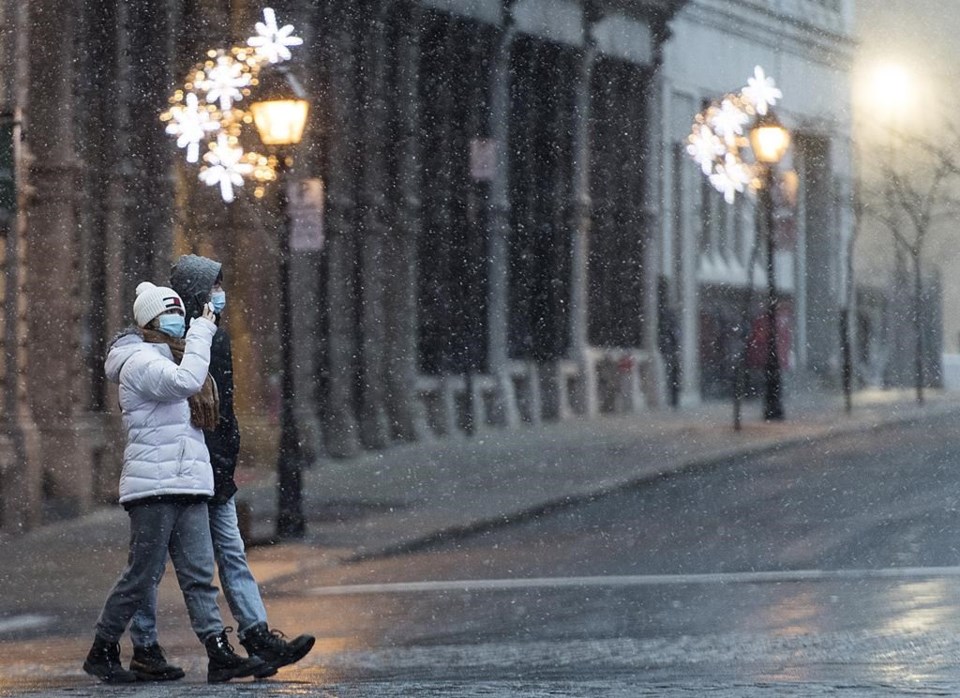MONTREAL — Quebec will have the staff and the infrastructure ready to begin vaccinating people against COVID-19 by Jan. 1, the province's health minister said Thursday.
"Do we have the people on the ground? The answer is yes. Can we do more than (200,000) per week? The answer is yes," Christian Dube told reporters in Quebec City.
Residents of long-term care homes and health-care workers will receive the vaccine first, followed by seniors living outside state-run care, Premier Francois Legault said at the news conference.
Quebec is working to ensure the infrastructure for vaccines, such as the one developed by Pfizer — which has to be stored at temperatures between -70 C and -80 C — is ready by early January, Dube said. The province will organize the delivery system for COVID-19 vaccines in the mould of its existing distribution network for the flu vaccine, he added.
Dube said Quebec is able to administer more than 200,000 flu vaccines per week, adding that the government is hoping to be able to vaccinate up to 500,000 people per week against COVID-19.
The only thing Quebec is waiting for, Legault said, is news from the federal government about when the vaccine will be available in Canada and how many doses Quebec will receive every week. He said the vaccination campaign will be led by assistant deputy health minister Jerome Gagnon and Dr. Richard Masse, senior advisor to the province's public health director, Dr. Horacio Arruda.
Quebec reported 32 more deaths attributed to the novel coronavirus on Thursday and 1,464 new infections — the highest daily total of new cases since the pandemic began. Dube said he remained focused on trends rather than daily case counts, adding that the number of new infections on any given day can vary based on several factors, including how many tests were analyzed.
The regions with the highest number of new cases were Montreal with 336; Saguenay, north of Quebec City, with 211; and Monteregie, southeast of Montreal, with 187. Saguenay remains Quebec's most affected region on a per capita basis, with almost 413 active cases per 100,000 people — more than three times Montreal's rate.
Health authorities said eight of the newly attributed COVID-19 deaths had occurred within the previous 24 hours. They said the number of people in hospital rose by 20 from a day earlier, to 675, and 90 of those people were in intensive care — a drop of three.
A COVID-19 outbreak at a long-term care centre in Montreal continued to grow, with five new cases reported Thursday. Forty-five residents of the Maimonides geriatric centre have active cases of COVID-19 and six people have died, according to Health Department data.
Family members of Maimonides residents held a protest outside the facility Thursday afternoon. Joyce Shanks, whose father is a resident at the centre, helped organize the protest. "I'm really scared," she said in an interview. "I'm afraid for his life."
She said the centre doesn't have enough staff and that they aren't subject to mandatory testing. Shanks said she'd like workers to be tested weekly. Dube said he's asked for a report on the situation at Maimonides and on whether additional staff is needed.
Meanwhile, Quebec's Education Department said Thursday that elections for English-language school boards, previously scheduled for Dec. 20, will be postponed for the second time.
Legault said he decided to postpone the elections because the vote was scheduled less than a week before the four-day period during which the province plans to allow gatherings up to ten people. The premier said Quebecers can gather twice, between Dec. 24 and Dec. 27, but that they must minimize their contacts the week before and after.
Quebec has reported a total of 136,894 COVID-19 infections and 6,947 deaths linked to the virus.
This report by The Canadian Press was first published Nov. 26, 2020.
———
This story was produced with the financial assistance of the Facebook and Canadian Press News Fellowship.
Jacob Serebrin, The Canadian Press

